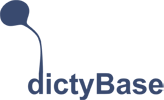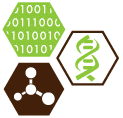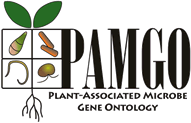The GO Consortium
The GO Consortium is the set of model organism and protein databases and biological research communities actively involved in the development and application of the Gene Ontology.
Consortium Members
Members of the GO Consortium are expected to show a significant and ongoing commitment to the utilization and further development of the Gene Ontology. Full members should fulfill the following criteria:
- staff funded to work on GO
- regular submission of annotations to the GO Consortium resources [where applicable]
- regular and significant contribution towards the content of GO
- send one or more representatives to GO Consortium meetings
- be willing to organize and host a Consortium meeting
All databases which receive funding from the GO grant are considered full Consortium members.
Current GO Consortium Members
Berkeley Bioinformatics Open-source Project (BBOP)
Development, use, and integration of ontologies into biological data analysis.
 British Heart Foundation - University College London (BHF-UCL)
British Heart Foundation - University College London (BHF-UCL)
The University College London-based annotation group of the Cardiovascular Gene Ontology Annotation Initiative prioritises the comprehensive manual annotationof genes associated with the cardiovascular system. This effort is directed and supported by leading cardiovascular researchers, and is funded by the British Heart Foundation.
goannotation@ucl.ac.uk (Contact BHF-UCL)
 dictyBase
dictyBase
Informatics resource for the slime mold Dictyostelium discoideum
dictybase@northwestern.edu (Contact dictyBase)
 EcoliWiki
EcoliWiki
Community annotation for Escherichia coli
 FlyBase
FlyBase
Database for the fruitfly Drosophila melanogaster
s.tweedie@gen.cam.ac.uk (Contact FlyBase)
 GeneDB
GeneDB
Includes databases for several protozoan parasites, including Plasmodium falciparum, Leishmania major and Trypanosoma brucei.
val@sanger.ac.uk (Contact Pombase)
 GO Editorial Office at the European Bioinformatics Institute
GO Editorial Office at the European Bioinformatics Institute
go-editors@ebi.ac.uk (Contact the GO Editorial Office)
 Gramene
Gramene
A comparative mapping resource for grains, including rice (Oryza)
gramene@gramene.org (Contact Gramene)
 Institute of Genome Sciences, Univ. of Maryland
Institute of Genome Sciences, Univ. of Maryland
Data and tools for genomic research in a variety of model systems.
mgiglio@igs.umaryland.edu (Contact IGS)
 InterPro
InterPro
InterPro provides functional analysis of proteins by classifying them into families and predicting domains and important sites.
 J Craig Venter Institute
J Craig Venter Institute
Databases on several bacterial species. Formerly known as The Institute for Genomic Research (TIGR).
lhannick@tigr.org (contact JCVI Eukaryote)
 Mouse Genome Informatics (MGI)
Mouse Genome Informatics (MGI)
Databases for the mouse Mus musculus
mgi-help@informatics.jax.org (Contact MGI)
 Pombase
Pombase
PomBase is a comprehensive database for the fission yeast Schizosaccharomyces pombe, providing structural and functional annotation, literature curation and access to large-scale data sets.
val@sanger.ac.uk (Contact GeneDB)
 Rat Genome Database (RGD)
Rat Genome Database (RGD)
Database for the rat Rattus norvegicus
vpetri@mcw.edu (Contact RGD)
 Reactome
Reactome
A knowledgebase of biological processes (formerly Genome Knowledgebase)
lisa.matthews@cshl.edu (Contact Reactome)
 Saccharomyces Genome Database (SGD)
Saccharomyces Genome Database (SGD)
Database for the budding yeast Saccharomyces cerevisiae; maintenance and public access of GO database and web interfaces
yeast-curator@genome.stanford.edu (Contact SGD)
 The Arabidopsis Information Resource (TAIR)
The Arabidopsis Information Resource (TAIR)
Database for the brassica family plant Arabidopsis thaliana
curator@arabidopsis.org (Contact TAIR)
 UniProtKB-Gene Ontology Annotation (UniProtKB-GOA)
UniProtKB-Gene Ontology Annotation (UniProtKB-GOA)
Manual and electronic annotation of proteins in the UniProt Knowledgebase (Swiss-Prot/TrEMBL/PIR-PSD), carried out by a wide range of curation activities at the European Bioinformatics Institute and the Swiss Institute of Bioinformatics.
goa@ebi.ac.uk (Contact UniProtKB-GOA)
 WormBase
WormBase
Database for the nematode Caenorhabditis elegans
wormbase-help@wormbase.org (Contact WormBase)
 The Zebrafish Information Network (ZFIN)
The Zebrafish Information Network (ZFIN)
Reference datasets and information on Danio rerio
curators@zfin.org (Contact ZFIN)
GO Associates
GO Associates are groups who make a notable contribution to the GO project. Typically, GO Associate groups contribute significantly in at least one of the following ways:
- contribution of annotations to the GO database (via a full Consortium member)
- provision of open source applications for use with GO, and ongoing development and support for these applications
- collaboration on major Gene Ontology content development
- financial or intellectual support
Current GO Associates
 AgBase
AgBase
A curated, open-source, web-accessible resource for functional analysis of agricultural plant and animal gene products
 AstraZeneca
AstraZeneca
 Candida Genome Database (CGD)
Candida Genome Database (CGD)
Muscle TRAIT
An integrated database of transcripts expressed in human skeletal muscle
 Plant-Associated Microbe Gene Ontology (PAMGO) consortium
Plant-Associated Microbe Gene Ontology (PAMGO) consortium
A collaboration for the development of annotation resources for researchers studying the genomics of plant-associated microbes
 Tetrahymena Genome Database (TGD)
Tetrahymena Genome Database (TGD)
GO Consortium Photo Album
- GO Consortium Meeting, Hôtel Mont Gabriel, Sainte-Adèle, Québec, Canada, October 21–23, 2008
- GO Consortium Meeting, Jesus College, Cambridge University, Cambridge, UK, January 8–10, 2007
- Annotation Camp, Stanford University, Palo Alto, California, USA, July 12–14, 2006
- Annotation Workshop, Stanford University, Palo Alto, California, USA, July 10–11, 2006
- GO Consortium Meeting, St. Croix, US Virgin Islands, March 31–April 2, 2006
- GO Users Meeting, MGED 8 meeting, University of Bergen, Norway, September 14–15, 2005
- Annotation Camp, Stanford University, Palo Alto, California, USA, June 1–4, 2005
- Caltech, Pasadena, California, USA, April 8–9, 2005
- Annotation Camp, Cambridge, UK, June 17, 2004
- Stanford University, California, January 17, 2004
- Bar Harbor, Maine, September 26, 2003
- TIGR, Rockville, Maryland, June 3, 2003
- Cold Spring Harbor Laboratory, New York, May 13, 2002
- Bar Harbor, Maine, July 15, 2001
- LBNL, Berkeley, California, November 5, 2000
- Bar Harbor, Maine, October 8, 1999